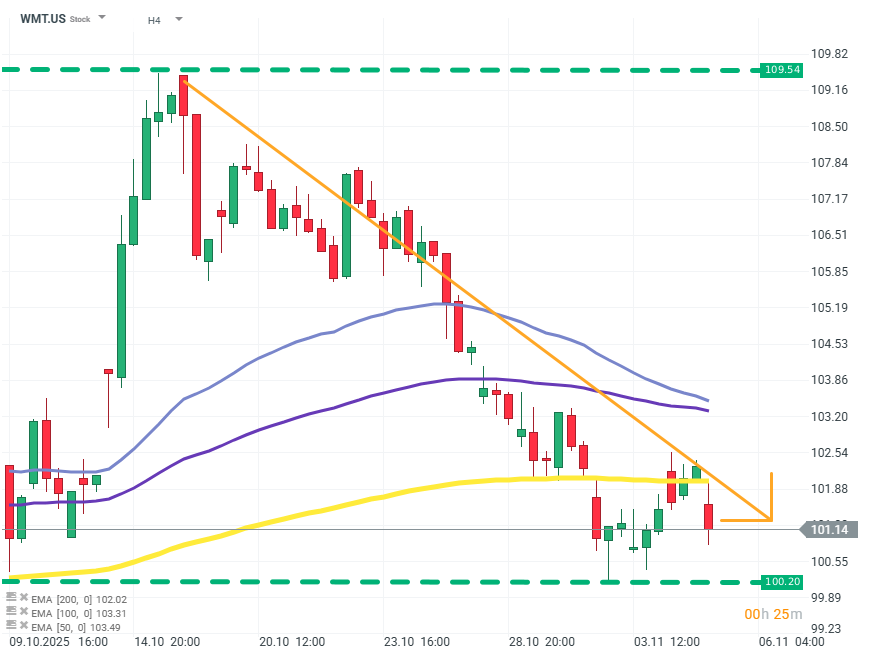The government shutdown currently ongoing in the United States, resulting from a budget bill dispute, has extended and officially become the longest in U.S. history. It has surpassed the previous 35-day shutdown, which also occurred under Donald Trump's administration. The economic, financial, and social impacts are increasingly widespread in the economy.
The latest crisis resulting from the government shutdown is the issue with funding the "SNAP" program, or the "Supplemental Nutrition Assistance Program." This program functions as a subsidy for food purchases for Americans who cannot feed themselves independently. Currently, the program covers 42 million people, which constitutes about 12% of the U.S. population.
The program was able to function for some time with reserves, but these have been depleted. The consequences of halting funding are much more severe than pushing a large portion of the population below the subsistence level. The SNAP program is a deeply embedded part of the American economy and society. Impressively, the SNAP program is one of the most efficient programs of its kind in the U.S. and worldwide.
- It costs about $100 billion annually, but each dollar of this program generates an estimated $1.5-1.8 in economic activity.
- Additionally, each billion dollars can sustain approximately 13,500 jobs.
The effects of suspending the program will ripple through the economy. The first victims will, of course, be the individuals covered by it. Secondly, companies and retail stores that actually made purchases under SNAP will feel the impact. This mainly includes Walmart and Kroger. SNAP payments account for several percent of all food expenditures in the U.S. For Walmart alone, this means a revenue drop of over $1.5 billion per month.
Significantly reduced sales in retail stores will lead to job cuts and create an economic downturn spiral in many communities. The same phenomenon will also put pressure on state budgets. The poorest states, where the economic situation is already bad, will feel the effects of these events much more acutely.
Since the market began to discount the suspension of SNAP payments, Walmart has lost over 7% of its valuation (over $57 billion in capitalization), and Kroger has lost simlar amount.
WMT.US (H4)

Source: xStation5
A closer look at the statistics and political positions of specific states and parties in the U.S. reveals a form of fundamental dysfunction in the American system and helps understand why the shutdown continues despite obvious and increasingly serious economic consequences.
Primarily, the Republican Party, which currently controls most significant offices in the U.S., advocates fighting against most forms of social security. Every day that benefits and subsidies are not paid is considered a success in itself by the GOP.
What escapes many commentators, especially outside US, is the fact that the mentioned social support is mainly dependent on poor states, which are predominantly Republican states. States voting for Democrats are, on average, much wealthier and less dependent on benefits, and state governments have a range of reserves and initiatives in place of SNAP payments.

Morning wrap (05.03.2026)

Iran: Situation overview and outlook

US OPEN: Wall Street buoyed by robust data and shifting sentiment

Daily summary: Markets aren’t afraid of the conflict, valuations are normalizing
The content of this report has been created by XTB S.A., with its registered office in Warsaw, at Prosta 67, 00-838 Warsaw, Poland, (KRS number 0000217580) and supervised by Polish Supervision Authority ( No. DDM-M-4021-57-1/2005). This material is a marketing communication within the meaning of Art. 24 (3) of Directive 2014/65/EU of the European Parliament and of the Council of 15 May 2014 on markets in financial instruments and amending Directive 2002/92/EC and Directive 2011/61/EU (MiFID II). Marketing communication is not an investment recommendation or information recommending or suggesting an investment strategy within the meaning of Regulation (EU) No 596/2014 of the European Parliament and of the Council of 16 April 2014 on market abuse (market abuse regulation) and repealing Directive 2003/6/EC of the European Parliament and of the Council and Commission Directives 2003/124/EC, 2003/125/EC and 2004/72/EC and Commission Delegated Regulation (EU) 2016/958 of 9 March 2016 supplementing Regulation (EU) No 596/2014 of the European Parliament and of the Council with regard to regulatory technical standards for the technical arrangements for objective presentation of investment recommendations or other information recommending or suggesting an investment strategy and for disclosure of particular interests or indications of conflicts of interest or any other advice, including in the area of investment advisory, within the meaning of the Trading in Financial Instruments Act of 29 July 2005 (i.e. Journal of Laws 2019, item 875, as amended). The marketing communication is prepared with the highest diligence, objectivity, presents the facts known to the author on the date of preparation and is devoid of any evaluation elements. The marketing communication is prepared without considering the client’s needs, his individual financial situation and does not present any investment strategy in any way. The marketing communication does not constitute an offer of sale, offering, subscription, invitation to purchase, advertisement or promotion of any financial instruments. XTB S.A. is not liable for any client’s actions or omissions, in particular for the acquisition or disposal of financial instruments, undertaken on the basis of the information contained in this marketing communication. In the event that the marketing communication contains any information about any results regarding the financial instruments indicated therein, these do not constitute any guarantee or forecast regarding the future results.


